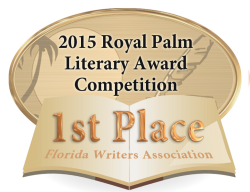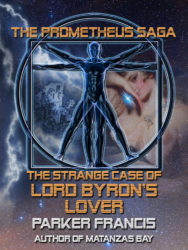Welcome to the RPLA Showcase

Each year at the Royal Palm Literary Award Banquet, authors experience the joy of earning accolades for all the hard work that is often done in the privacy of the home with little to no recognition. Our goal is to showcase the best of the best at the 2015 Royal Palm Literary Awards and provide First Place winners with a well-deserved spotlight. Not only are we recognizing extraordinary talent, but we’re giving readers an opportunity to sample excerpts from the winning stories.
2015 Published General Fiction
The Strange Case of Lord Byron’s Lover by Parker Francis
Victor DiGenti, writing as Parker Francis, won First Place in the Published General Fiction category. In The Strange Case of Lord Byron’s Lover, Mary Shelley recounts a series of perplexing events during her visit with Lord Byron—a visit that resulted in the creation of the Frankenstein novel, but also uncovered a remarkable mystery.
Click the link to read a sample:
Excerpt from The Strange Case of Lord Byron’s Lover
Q & A with Victor DiGenti
Q: Where do you get your story ideas?
A: I sometimes tell people my weird ideas are the result of the strange medications I took back in the 60s, or that I buy them on eBay. That’s ridiculous, of course. Everyone knows eBay doesn’t sell ideas. That’s Craig’s List. But the truth is ideas can come from anywhere: from something we read or see on TV. From dreams, or an incident we observed, or a story someone tells us. Or from our own personal experiences. For example, I’ve suffered with tinnitus for years, and finally decided to get even by writing a story about a rock musician with a severe case of tinnitus who has to drop out of the band and contemplates suicide because of his condition. However, in my story, Ghostly Whispers, the persistent noise in his head is eerily transformed into an internal newscaster who forecasts future events. I told you I had weird ideas. And sometimes a story idea takes a while to jell. I’m currently rewriting a much rejected horror story I first wrote almost thirty years ago, giving it a different slant.
Q: Anything in particular about your award-winning RPLA entry that you’d like to share?
A: “The Strange Case of Lord Byron’s Lover” is what I’d call a historical speculative mystery, and very different from the mystery/thriller genre I usually write. It’s part of The Prometheus Saga anthology, which has a common theme about an alien life force left behind 40,000 years ago by an advanced race to keep track of the nascent human tribe. The twelve authors in the book were advised to set our stories in any time period over the last 40,000 years, but we had to use the human-like alien as one of the characters. My story takes place in June, 1816 when Mary Godwin and her soon-to-be-husband, Percy Bysshe Shelley, spent time with Lord Byron in Lake Geneva. Writing in her journal, Mary Shelley recounts a series of perplexing events during her visit with Lord Byron—a visit that resulted in the creation of her famous Frankenstein novel, but also uncovered a remarkable mystery. How Mary came up with the idea, and the peculiar person she met in Byron’s Villa Diodati, forms the basis of “The Strange Case of Lord Byron’s Lover.
Q: Who do you credit with inspiring your writing?
A: While time is running out for winning a Pulitzer Prize or National Book Award, I’m inspired to be the best writer I can be and make the most of the soupçon of talent I’ve been given. I’ve been a voracious reader all my life and that inspired me to stretch my own writing wings and jump off cliffs daily, as Ray Bradbury told us writers must do. Positive feedback always helps, and when in the sixth grade I heard the applause of my fellow students in a school assembly after reading my prize-winning essay on What America Means to Me I thought, “Hey, they like me, they really like me.” Or maybe I’m confusing that event with Sally Fields winning an Oscar. But my sixth grade memory is still strong, and it propelled me to keep writing, just as winning RPLAs does today. Writers can be inspired by the works of other writers, of course, and I have a long list of favorites going back to Dr.Seuss, and we can find encouragement from family and peers, but I believe true inspiration comes from within and the drive to become a better writer.
Q: Any tips for new writers?
A: There are only so many ways to say it, and new writers who want to become veteran writers will quickly learn for themselves that to be a writer requires persistence and self-discipline as much as talent. Sure, we hear about overnight success stories, and read bestselling books that might cause us to scratch our heads, but again look within and find your emotional center. If you see a writer in there dying to get out, then you’ll do everything possible to nurture the talent through learning and refining your craft. This means attending conferences and writer’s meetings, joining a critique group, and reading the works of other writers you admire. Above all, writing means rewriting and revising. It has all been said before, hasn’t it, but I don’t believe there are any shortcuts. If you want to write fiction, Lawrence Block advises, “… take two aspirins, lie down in a dark room until the feeling passes. If it persists, you probably ought to write a novel.”

